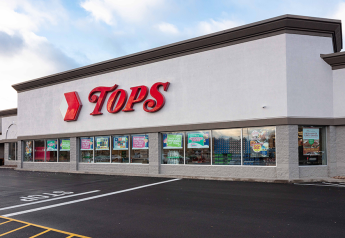Resourceful farmers adapt to a changing climate, finding new ways to combat pests and conserve water
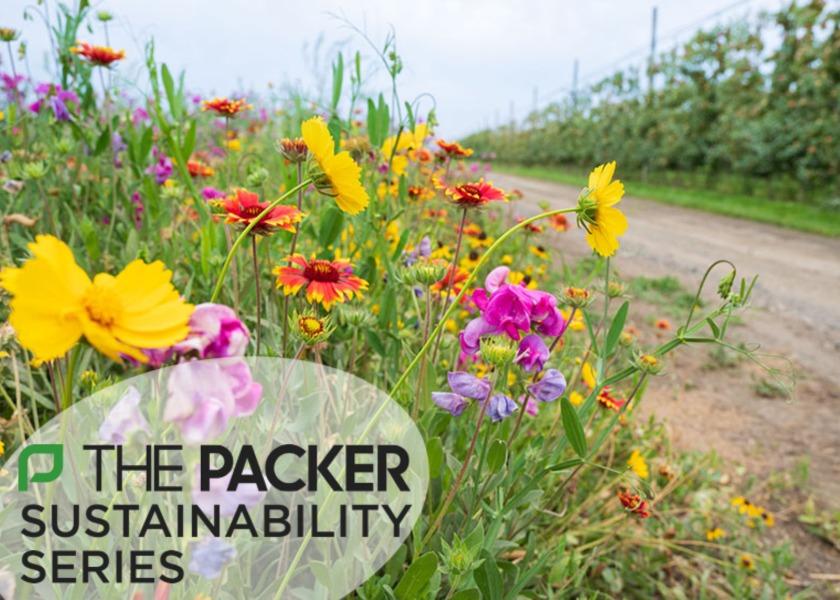
Producers across the fresh produce supply chain are hard at work, pioneering ways to grow, harvest and package fruits and vegetables while reducing their carbon footprint. The Packer met with growers, retailers and innovators to learn more about what they are doing to promote sustainability.
Creative and resourceful, many producers are actively improving sustainability in their supply chains, focusing on priorities such as:
- Improving soil health;
- Emphasizing integrated pest management;
- Conserving water;
- Adopting packaging innovations;
- Reducing food waste; and
- Improving supply chain traceability.
Part one of our Sustainability Series spotlights what growers and chemists are doing to improve soil health. But healthy soil is just one piece of the sustainable agriculture puzzle. Encouraging integrated pest management and conserving water are two strategies that growers can incorporate to grow, harvest and package fruits and vegetables while reducing their carbon footprint.
Combating pests
Growers focused on reducing impact can also strategically target pesticide and fertilizer applications. Integrated pest management — a science-based, decision-making process to manage pests using the lowest-risk option — is one way to do this. One popular IPM strategy is to encourage vibrant ecosystems where plants, not pests, can thrive.
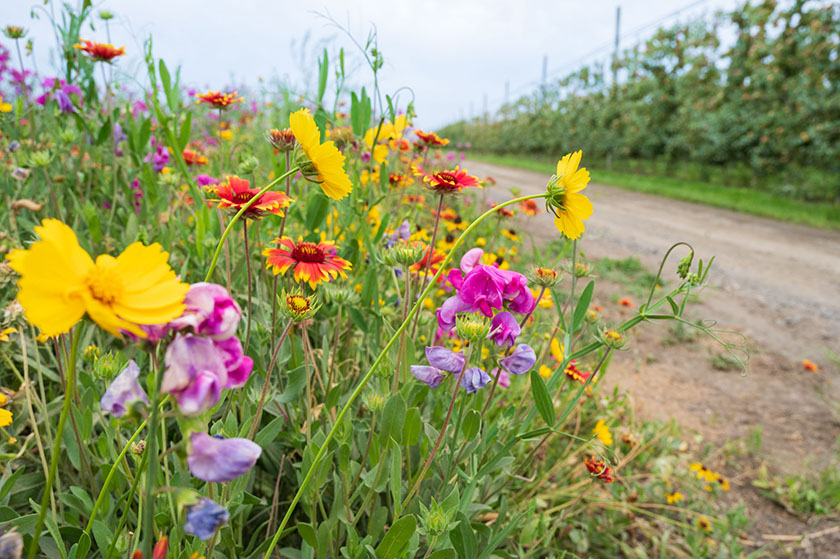 Located in arid eastern Washington, Stemilt capitalizes on a pest-inhibiting, dry climate and relies on pest control that includes beneficial insects like ladybugs. According to Shales, Stemilt also became Bee Friendly Farming-certified in 2021, “which means we will have over 400 acres of native wildflowers and bee forage to support pollinators.”
Located in arid eastern Washington, Stemilt capitalizes on a pest-inhibiting, dry climate and relies on pest control that includes beneficial insects like ladybugs. According to Shales, Stemilt also became Bee Friendly Farming-certified in 2021, “which means we will have over 400 acres of native wildflowers and bee forage to support pollinators.”
“We also use kestrels and falcons to ward off pest birds in cherry orchards. We utilize traps to count pests and determine the needs and introduce pheromones to disrupt mating patterns of pests,” she added. “There is a lot that goes into this area at Stemilt.”
Similarly, Gutierrez attributes a thriving ecosystem teeming with beneficial insects as one effective approach to combating pests at Limoneira. In citrus orchards at Limoneira, farmers “incentivize the movement of natural [pest] enemies, so they’re not stuck on the edges of the orchards.” They do this by planting biological corridors — essentially strategically placed hedgerows — lush with pollinator-friendly flowers and forage.
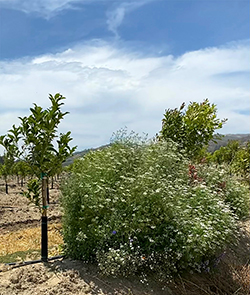 “Every 10 trees and every five rows in its orchard, we plant a corridor with pollinator and insect-friendly floral plants. This is to feed and promote thriving, beneficial insect colonies that suppress pests,” according to Gutierrez. “One thing we’ve been seeing, a lot of the interaction when you do a release of biological organisms to control pests, it goes to the edge of the plantation. These predators are beneficial insects; they really don’t have a food source in the orchard. They don’t have the food source to sustain the population.”
“Every 10 trees and every five rows in its orchard, we plant a corridor with pollinator and insect-friendly floral plants. This is to feed and promote thriving, beneficial insect colonies that suppress pests,” according to Gutierrez. “One thing we’ve been seeing, a lot of the interaction when you do a release of biological organisms to control pests, it goes to the edge of the plantation. These predators are beneficial insects; they really don’t have a food source in the orchard. They don’t have the food source to sustain the population.”
Growing a commodity crop is often cultivating a large-scale monoculture. Farming this way “alters the balance between the pests and the natural enemies,” said Gutierrez. When you encourage safe harbors for beneficial insects, you’re able to “create these natural colonies to create and raise populations that will have a better control of the natural pests. That’s the main goal.”
Consalo Family Farms enlisted the expertise of Rutgers University scouts to trial pest and weed treatments used on their farms. The aim, according to Consalo, is to reduce risks to the environment and people. Rutgers’ program incorporates economic threshold levels into its IPM field testing. Consalo trials “pest-phenology models, resistant varieties, optimum horticultural practices, weather monitoring, pest scouting and fertility monitoring.”
Pollinators pay a critical role in growing blueberries at Consalo Family Farms. In particular, “our blueberry pollination depends on bees. Blueberry pollination is contingent on having enough bees active in the field during bloom to deliver pollen. We utilize both honeybees and bumblebees on our blueberry farms,” says Consalo.
Conserving water
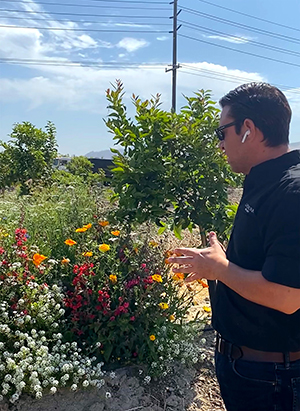 Challenges such as shifting season dates because of warming temperatures, more-frequent extreme weather events threatening crops, and water- and energy-reliability issues are now commonplace. Water and energy resources that producers once took for granted are no longer guaranteed, and California has experienced water challenges that will likely only increase in the state that relies on steady water access for irrigation.
Challenges such as shifting season dates because of warming temperatures, more-frequent extreme weather events threatening crops, and water- and energy-reliability issues are now commonplace. Water and energy resources that producers once took for granted are no longer guaranteed, and California has experienced water challenges that will likely only increase in the state that relies on steady water access for irrigation.
Based in Santa Paula, Calif., Limoneira has felt the rising pressures of water challenges. Limoneira is “definitely impacted by the extreme weather. But whenever you come out of your comfort zone, that’s what makes you grow,” said Gutierrez
Right now, “we’re making decisions to pull back on some acres and plots to provide to other plots ... At all our farms, we use technology to better irrigate, and this has given us a greater insight to see where we were wasting water. This has been a reality check about how and when we water. Technology helps.”
Consalo Family farms uses drip irrigation to water the minimum amount of water necessary at the right time, eliminating overwatering. Apps that measure water levels and meters also help precision-watering, says Consalo.


